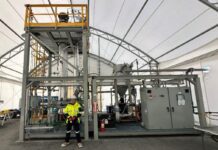
The JP Morgan Global Manufacturing Purchasing Managers’ Index (PMI) remained in the contraction territory at the end of the year’s third quarter, posting a 49.1 rating up from August’s 49.0.
The latest reading comes as all five of the sub-indices comprising the headline PMI, output, new orders, employment, stocks of purchases, and suppliers’ delivery times, see a decline in overall performance in September.
The result also means that a marginal deterioration in business conditions in the manufacturing industry endured for the 13th consecutive month.
“The recent manufacturing production malaise is attributable to an ongoing deterioration in demand, as indicated by a fifteenth successive monthly decline in new orders received by factories worldwide in September,” said Chris Williamson, chief business economist at S&P Global Market Intelligence.
“Leading the downturn in orders was further marked drop in global trade, as measured by new export orders received by manufacturers around the world, which continued to fall at one of the steepest rates seen since the global financial crisis.”
The Eurozone, UK, and Canada posted steep overall downturns, while the US posted higher output and jobs but lower new orders.
China and Indonesia currently lead the survey in global growth.
The JP Morgan Global Manufacturing PMI compiled by S&P Global also revealed that global manufacturing output declined for the fourth successive month in September, as further contractions in the intermediate and investment goods industries were only partly offset by growth at consumer goods producers.
The decline in output is primarily attributed to a weaker intake of new orders. Destocking also played a role with inventories of both finished products and raw materials decreasing during the latest survey month.
Worries about the risks of recession and the impact of higher-for-longer interest rates were key factors affecting optimism about production in the coming year, according to Williamson.
“Future output expectations remained well below their long-run average in September despite picking up slightly on August, led by improved expectations in the US. The data suggest companies are not anticipating any imminent overall improvement in the global manufacturing situation, though we continue to watch the inventory cycle for signs that production may see some support from this area as we head into 2024.”




















